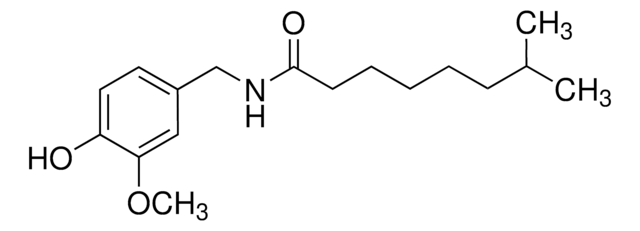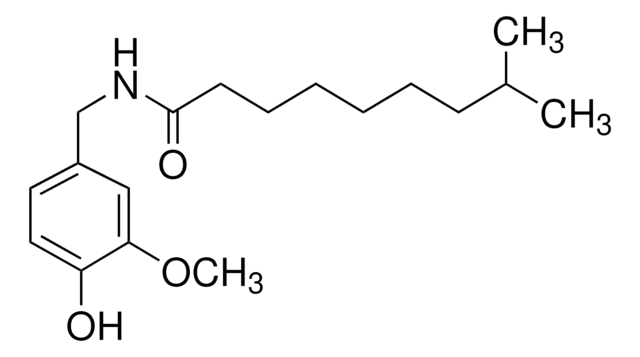1091108
USP
Capsaicin
United States Pharmacopeia (USP) Reference Standard
동의어(들):
8-Methyl-N-vanillyl-trans-6-nonenamide
로그인조직 및 계약 가격 보기
모든 사진(1)
About This Item
Linear Formula:
(CH3)2CHCH=CH(CH2)4CONHCH2C6H3-4-(OH)-3-(OCH3)
CAS Number:
Molecular Weight:
305.41
Beilstein:
2816484
MDL number:
UNSPSC 코드:
41116107
PubChem Substance ID:
NACRES:
NA.24
추천 제품
Grade
pharmaceutical primary standard
API family
capsaicin
제조업체/상표
USP
mp
62-65 °C (lit.)
응용 분야
pharmaceutical (small molecule)
형식
neat
저장 온도
2-8°C
SMILES string
COc1cc(CNC(=O)CCCC\C=C\C(C)C)ccc1O
InChI
1S/C18H27NO3/c1-14(2)8-6-4-5-7-9-18(21)19-13-15-10-11-16(20)17(12-15)22-3/h6,8,10-12,14,20H,4-5,7,9,13H2,1-3H3,(H,19,21)/b8-6+
InChI key
YKPUWZUDDOIDPM-SOFGYWHQSA-N
유전자 정보
human ... TRPV1(7442)
유사한 제품을 찾으십니까? 방문 제품 비교 안내
일반 설명
This product is provided as delivered and specified by the issuing Pharmacopoeia. All information provided in support of this product, including SDS and any product information leaflets have been developed and issued under the Authority of the issuing Pharmacopoeia. For further information and support please go to the website of the issuing Pharmacopoeia.
애플리케이션
Capsaicin USP reference standard for use in specified quality tests and assays.
Also used to prepare standard solutions for the assay, identification, composition and strength analysis according to the given below monographs of United States Pharmacopeia (USP):
Also used to prepare standard solutions for the assay, identification, composition and strength analysis according to the given below monographs of United States Pharmacopeia (USP):
- Capsaicin
- Capsicum Oleoresin
- Capsicum
- Ginger Tincture
생화학적/생리학적 작용
Prototype vanilloid receptor agonist. Neurotoxin; activates sensory neurons that give rise to unmyelinated C-fibers, many of which contain substance P. Topical application desensitizes the sensory nerve endings giving a paradoxical antinociceptive effect; systemic administration can be neurotoxic to capsaicin-sensitive cells, especially in newborn animals. Active component of chili peppers.
Prototype vanilloid receptor agonist; neurotoxin. Active component of chili peppers.
분석 메모
These products are for test and assay use only. They are not meant for administration to humans or animals and cannot be used to diagnose, treat, or cure diseases of any kind.
기타 정보
Sales restrictions may apply.
신호어
Danger
유해 및 위험 성명서
Hazard Classifications
Acute Tox. 2 Oral - Eye Dam. 1 - Resp. Sens. 1 - Skin Irrit. 2 - Skin Sens. 1 - STOT SE 3
표적 기관
Respiratory system
Storage Class Code
6.1A - Combustible acute toxic Cat. 1 and 2 / very toxic hazardous materials
WGK
WGK 3
Flash Point (°F)
235.4 °F - closed cup
Flash Point (°C)
113 °C - closed cup
가장 최신 버전 중 하나를 선택하세요:
이미 열람한 고객
Capsicum Oleoresin
United States Pharmacopeia, 38(4), 730-730 (2019)
Capsaicin
United States Pharmacopeia, 727-727 (2013)
Maija Haanpää et al.
European neurology, 68(5), 264-275 (2012-10-06)
Capsaicin has long been used as a traditional medicine to treat pain and, recently, its mechanism of analgesic action has been discovered. This review article documents the clinical development of capsaicin to demonstrate that pharmacognosy still has a profound influence
Jessica O'Neill et al.
Pharmacological reviews, 64(4), 939-971 (2012-10-02)
A large number of pharmacological studies have used capsaicin as a tool to activate many physiological systems, with an emphasis on pain research but also including functions such as the cardiovascular system, the respiratory system, and the urinary tract. Understanding
Astrid J Terkelsen et al.
Anesthesiology, 120(5), 1225-1236 (2014-03-14)
Complex regional pain syndrome is multifactorial. Exaggerated inflammatory responses to limb injury may be involved. The authors hypothesized that capsaicin-induced pain and neurogenic inflammation (skin perfusion and flare area) are increased in patients with complex regional pain syndrome compared with
자사의 과학자팀은 생명 과학, 재료 과학, 화학 합성, 크로마토그래피, 분석 및 기타 많은 영역을 포함한 모든 과학 분야에 경험이 있습니다..
고객지원팀으로 연락바랍니다.









